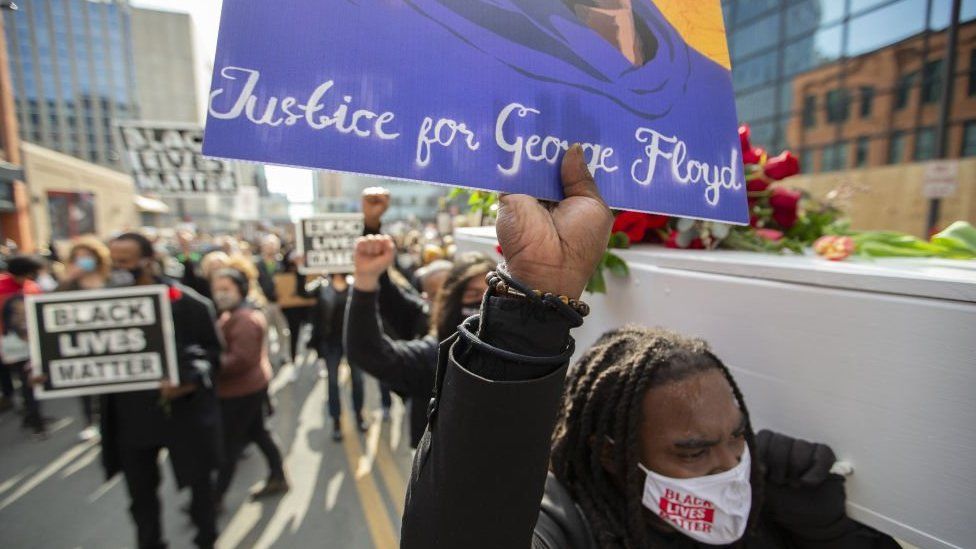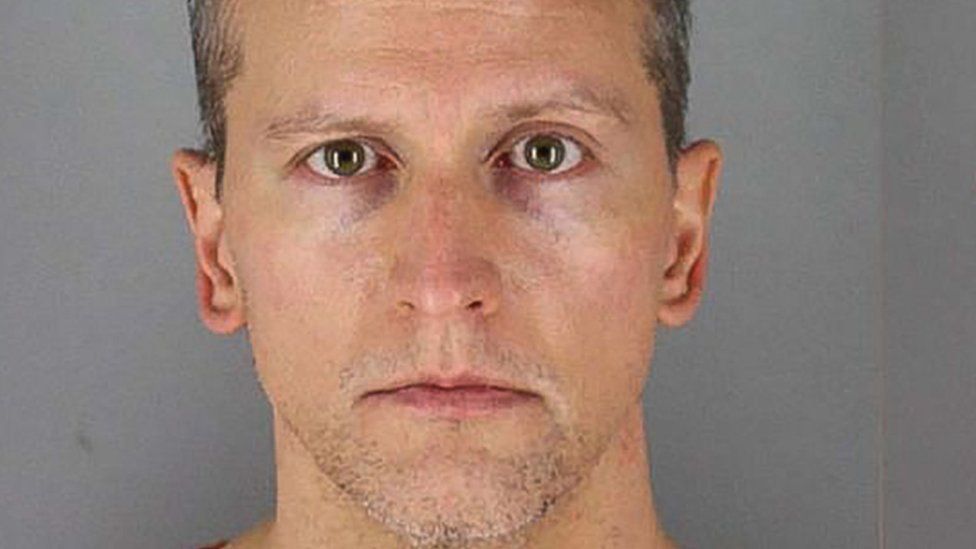
A US judge has delayed jury selection in the case of an ex-Minneapolis police officer accused of killing George Floyd, an unarmed black man, last May.
Derek Chauvin faces murder charges for kneeling on Mr Floyd's neck for over seven minutes in a widely-viewed video that sparked protests worldwide.
The delay came as the judge awaits an appeals court decision on whether a new murder charge can be added.
Jury selection could resume on Tuesday morning at the earliest.
Mr Chauvin is accused of second-degree unintentional murder and manslaughter in the 25 May death of Mr Floyd. The maximum sentence he faces on that count is 40 years.
The less severe charge of third-degree murder was initially dismissed last year, but prosecutors have requested to reinstate it.
Legal experts say that adding a third-degree charge could make it easier for prosecutors to get a conviction.
Jury selection is expected to take about three weeks, with trial arguments due to begin on 29 March.
More than 370 potential witnesses could be called to testify.
What happened in court?
The judge's decision followed prosecutors saying they would ask the appeals court to delay proceedings as the panel weighs whether the third-degree murder charge can be brought against Mr Chauvin.
Hennepin County District Court Judge Peter Cahill said it was unlikely the appeals panel would respond before Tuesday.
"So unless any of the parties object I'm going to kick our jurors loose and start everything tomorrow with jury selection," the judge said.
Lawyers for Mr Chauvin said they would ask the Minnesota Supreme Court to review the court of appeals decision, which could lead to further delays.
Mr Chauvin, who was fired from the Minneapolis police force and is currently free on a $1m (£725,000) bail, wore a blue suit and tie to court, as well as a black face mask. He took notes on a yellow legal pad during the hearing.

How has the city been preparing?
The death of Mr Floyd sparked racial justice protests around the world. Most demonstrations were peaceful, though some turned violent.
The trial, which is the fourth involving the killing of a civilian by a police officer in modern Minnesota history, has been highly anticipated.
Barricades, fencing and barbed wire surround the courthouse in downtown Minneapolis as police brace for protests.
On Monday, hundreds of demonstrators gathered in the city. Marches also occurred over the weekend.
Three other ex-officers who were involved in Mr Floyd's arrest are due to stand trial together later this year.

'I hope they find unbiased people'
Analysis by Tara McKelvey, BBC News, Minneapolis
Barbed wire surrounds the courthouse, and Forest McClarron, 34, an army veteran, walks past, looking up at the building.
He lives on Chicago Avenue, where George Floyd was pinned to the ground.
"I hope they find unbiased people," McClarron says, referring to the jury selection process. "Just honest, unbiased people."
Near him a woman walks with her husband to a vehicle parked on South Third Avenue. He has an assault rifle, and a paper cup sits on the bonnet of the vehicle.
He works in private security, and they are here to keep activists safe "from white supremacists," they say.
The mood is calm and the street smells like cannabis while people wait to see what happens with the jury, and with those who have gathered outside the courthouse.

How is the jury being selected?
A jury of 12 and four alternates will be selected by lawyers for each side from a pool of eligible local citizens.
Each potential juror has filled in a 16-page questionnaire, which asks about news viewing habits, how many times they watched the video of Mr Floyd's arrest, belief in the US criminal justice system, and other questions related to the case.
In cases involving issues such as racism, the selection process can be seen as hugely important to the outcome of the trial and how fair it is perceived.
What happened to George Floyd?
The 46-year-old was arrested outside a convenience store on suspicion of using a counterfeit $20 bill.
Officers arrived and handcuffed him, but when they tried to put him into the squad car he resisted and a struggle ended with Mr Floyd face down on the street.
Mr Chauvin, 44, placed his left knee between Mr Floyd's head and neck, and kept it there for seven minutes and 46 seconds, according to prosecutors. Two other officers helped pin him down, while another prevented witnesses from intervening.
Mr Floyd said he could not breathe more than 20 times. The video shows him go limp and get carried away by police.
He was pronounced dead in hospital an hour later.
https://news.google.com/__i/rss/rd/articles/CBMiM2h0dHBzOi8vd3d3LmJiYy5jby51ay9uZXdzL3dvcmxkLXVzLWNhbmFkYS01NjMyNTc3M9IBN2h0dHBzOi8vd3d3LmJiYy5jby51ay9uZXdzL2FtcC93b3JsZC11cy1jYW5hZGEtNTYzMjU3NzM?oc=5
2021-03-08 17:16:24Z
52781419046006
Tidak ada komentar:
Posting Komentar